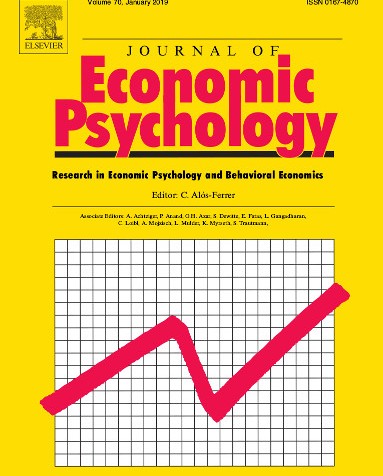On January 1st, 2019, I became the Editor in Chief of the Journal of Economic Psychology (JoEP), an interdisciplinary journal which publishes research both on Economic Psychology and on Behavioral Economics. I have succeeded Martin Kocher and Stefan Schulz-Hardt, who in turn succeeded Erik Hoelzl and Eric Kirchler a couple of years ago. There will eventually be a second Co-Editor, but for the moment being I am alone at the helm, and I have committed to be a Co-Editor until at least end of 2022. I know the journal well, as I have been in the board as an Associate Editor for some years now (since the times of Erik and Eric). Continue reading
Category Archives: Economics and Game Theory
The Theory of Extensive Form Games
 Together with my most-frequent coauthor Klaus Ritzberger, I have been working on the formal-analytical foundations of extensive form games for over 15 years now. Last year, we made a (considerable) effort and reorganized our published research on this topic. The result is a book, of course called The Theory of Extensive Form Games, published by Springer Verlag as part of the official series of the Game Theory Society, which was presented at the recent World Conference in Maastricht (2016).
Together with my most-frequent coauthor Klaus Ritzberger, I have been working on the formal-analytical foundations of extensive form games for over 15 years now. Last year, we made a (considerable) effort and reorganized our published research on this topic. The result is a book, of course called The Theory of Extensive Form Games, published by Springer Verlag as part of the official series of the Game Theory Society, which was presented at the recent World Conference in Maastricht (2016).
If you know anything about how the academic world works, you might be wondering “Why would a researcher write a book?” Indeed. We serious academics get zero credit for books, since the only milestones in our careers are peer-reviewed research articles (caveat: I am speaking about social and natural sciences here). So investing time in writing books is, in terms of opportunity costs, a bad decision. And the target audience are other researchers and advanced grad students, so it’s not like we will make any serious money out of that (Springer recently sent us the data for 2016: we sold around a 100 copies, which is more than I expected). So why did we do it? Continue reading
Economic Decisions and the EEG: An Example
Many neuroeconomics studies use fMRI machines. In my group, we currently concentrate on the electroencephalograph (EEG). The main reason is that we are interested in the analysis of decision processes in the brain, and the EEG has an excellent time resolution, while the fMRI is better for questions requiring a fine spatial resolution, e.g. brain localization.
An example of what the EEG can do for economic research, and in particular decision theory, is in a paper from my lab (Achtziger, Alós-Ferrer, Hügelschäfer, and Steinhauser, 2014), published in the journal Social Cognitive and Affective Neuroscience (with the lovely acronym SCAN). In case you are wondering, authors are in alphabetical order as per econ conventions; unlike neuroscientists, economists do not quibble about who has contributed more to a given paper.
Continue reading
Fairness is a Thin Layer
A quote attributed to Werner Herzog reads that “civilization is like a thin layer of ice upon a deep ocean of chaos and darkness.” Some of my recent work together with Anja Achtziger and Alexander K. Wagner points out that the same might be true about fairness and pro-social behavior.
Take our 2015 article “Money, Depletion, and Prosociality in the Dictator Game,” published in the Journal of Neuroscience, Psychology, and Economics. Merely days after publication, it found some echo in the press, for instance here.
Continue reading
Coordination, Networks, and Technological Standards
Coordination games are a stylized model for, well, coordination problems. Think of computer operating systems. Windows, Mac, or Linux? Technological choice is also a good example. The past decades have seen quite a number of “format wars” in the multimedia sector, for instance when Sony-supported BluRay was able to wipe out the Toshiba-backed alternative HD-DVD format, each of them with back doors into people’s homes through gaming platforms (PS3 vs. XBox 360). Older generations (damn, I am getting old) will remember the battle between VHS and Betamax (remember the third format, Video 2000? You do? OK, you are officially old now!). Establishing a standard, in any field, always leads to a coordination game, from deciding which side of the street to drive on or adopting the metric system to establishing a particular container size for transport or adopting a management practice. If everybody adopts the same standard, nobody will want to deviate, hence we are at a Nash equilibrium, as explained in basic Game Theory. But every single standard is a Nash equilibrium, so which one should we coordinate on? Continue reading
Dieser Eintrag wurde gelöscht
Es gab hier mal einen Eintrag über studentische Empörungswellen, Mathe-Angst, und den Anschein der Ausländerfeindlichkeit. Ich wurde “von oben” darum gebeten, diesen Eintrag zu löschen. Er wurde also gelöscht, denn so wichtig ist es mir nicht (mehr). Meine Meinung ist und bleibt meine Meinung, jedoch ist sie in dieser Angelegenheit hier nicht mehr zu lesen, denn es könnte eine Empörungswelle geben. Für alle die es verstehen: dem Anschein nach, N=4.
Stereotyping and the dangers of being an economic theorist
Imagine being a scientist, let’s say an economic theorist, boarding a plane to give a talk at some university. Since you are a busy person, you are of course going to spend the time working, so you start doing some math, for example solving a differential equation, scribbling a mixture of Greek letters and curly symbols in your notepad. That is, writing mathematical equations. Continue reading
Quo Vadis, Economics? (III) Economics Needs More Data, and a Lot More Maths
Economics, as psychology, studies human behavior. Unlike psychology, however, economics has always faced harsh demands to deliver quantitative predictions. Knowing that human beings favor this or that is not enough. How much are they willing to pay for it? Are consumers better or worse off if the an airline merger is authorized, or if a state monopoly is forced to admit competition? By how much more will the unemployment rate go up in countries in the south of Europe in the next two years if the German savings rate remains unabated? Continue reading
Quo Vadis, Economics? (II) Micro- and Macro-Models of Bounded Rationality
Economics has long split in two thematically overlapping but well-differentiated areas: microeconomics and macroeconomics. Macroeconomics is supposed to answer questions at the aggregate level (Can economic crises be predicted? Should a central bank target unemployment?). The key implicit assumption which singles out the macroeconomics approach is the hope that individual behavior does not matter much at the aggregate level. And I say “hope” intentionally, for it is but a weak hope at best, and it might just be wishful thinking at worst. It is, however, an understandable approach. The more empirically-oriented parts of macroeconomics have often turned to sophisticated statistical techniques to fit and forecast (but not necessarily understand) economic trends at the aggregate level, ignoring any behavioral foundation. Which is as it should be: we do not have the time to build sophisticated, realistic theories to predict the effect on next semester’s unemployment rate if a particular public spending program is approved. Continue reading
Quo Vadis, Economics? (I) Economics and Bounded Rationality
Few people would criticize the hospital’s physicians for not predicting the exact day of the onset of cancer in a patient, especially if the patient has been consistently ignoring the physician’s advice about living in a more healthy way. Likewise, few people will question the usefulness of geology as a science simply because our knowledge is still too meager, or the Earth’s structure is too unstable, for geologists to accurately predict earthquakes. However, for some reason it has become something of a sport to openly criticize economists and the economic science as a whole for an alleged failure to predict specific economic crises. Get real, guys. Continue reading

